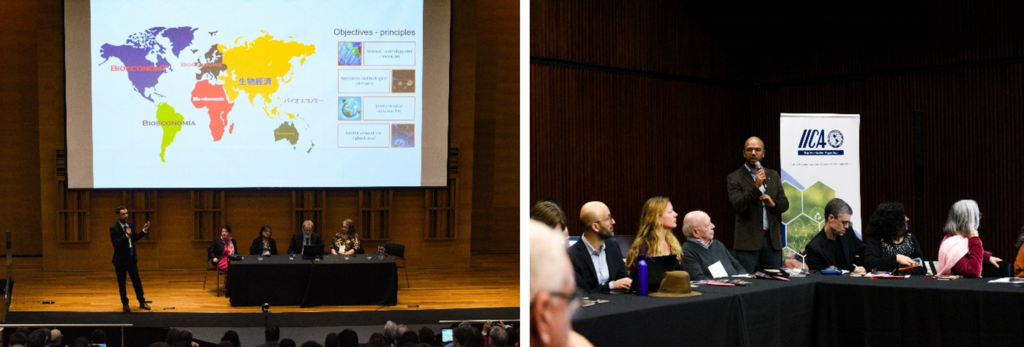En el marco de la 27ª Conferencia Anual del Consorcio Internacional de Investigación en Bioeconomía Aplicada coorganizada por el gobierno argentino, el Icabr y el Instituto Interamericano de Cooperación para la Agricultura (IICA), se formalizó la creación de la Red Latinoamericana de Bioeconomía.

Este importante hito cuenta con el respaldo de tomadores de decisión de la bioeconomía provenientes de Ecuador, Colombia, Argentina, Brasil, Uruguay y Paraguay, así como de los más importantes organismos internacionales y regionales que trabajan para fomentar la bioeconomía en la región, como el Instituto Global de Crecimiento Verde (GGGI), el Banco Interamericano de Desarrollo (BID), la Unesca, el Instituto Humboldt, la Agencia de Cooperación de Alemania, la Fundación Getulio Vargas, el Stockholm Environment Institute, Allbiotech, iGEM, Biointropic, Corporación Biotec de Cali, Grid Exponential, SF500, RedBio, CREA y Aapresid, entre otros.
Durante este espacio, los participantes discutieron sobre las acciones requeridas para, a partir de los esfuerzos en marcha, convertir a la bioeconomía en un modelo de desarrollo basado en el aprovechamiento sostenible de los recursos y principios biológicos de Latinoamérica.
Con el IICA ejerciendo el rol de la Secretaría Ejecutiva y Técnica, y a través de un proceso de discusión y construcción participativa entre todos los asistentes, se definieron seis prioridades de trabajo para la Red:
1) definición de métricas para medición y evaluación de la bioeconomía;
2) gobernanza de las bioeconomías regionales, nacionales y locales;
3) posicionamiento de la bioeconomía de la región en los espacios internacionales de negociación;
4) sensibilización y comunicación sobre potencial y riesgos de la bioeconomía;
5) aceleración y escalamiento de soluciones de la bioeconomía;
6) construcción de abordajes propios de la bioeconomía en países, territorios y cadenas.
Adicionalmente, se acordó la importancia de desarrollar a largo plazo un Plan Estratégico conjunto y la creación de un Comité Internacional Asesor.
Este marco de trabajo conjunto tiene como objetivo principal compartir iniciativas y proyectos, fortalecer la confianza entre los miembros y construir una comunidad de práctica. Estas iniciativas contribuirán a la consolidación de la bioeconomía en la región, brindando un espacio para el debate, el intercambio y la construcción colectiva entre los principales referentes de la bioeconomía.
Cristian Rivera, gerente de proyectos de GGGI Colombia, señala: “GGGI Colombia tiene una destacada trayectoria en bioeconomía. Su integración en esta apuesta no solo solidifica el compromiso de GGGI con el fomento de este sector en el país, sino que también abre una puerta para fortalecer los programas de GGGI en toda la región”.
Este nuevo enfoque de colaboración regional promete una expansión significativa de los esfuerzos en bioeconomía, llevando las iniciativas de cada país a un nivel más alto y compartiendo las mejores prácticas entre los miembros. La creación de la Red Latinoamericana de Bioeconomía es un hito crucial para el desarrollo sostenible de la región, y GGGI Colombia espera participar activamente y liderar algunos de los esfuerzos en este camino para promover un futuro más verde y sostenible para Latinoamérica.
____
In the context of the 27th Annual Conference of the International Consortium of Applied Bioeconomy Research, co-organized by the Argentine government, Icabr, and the Inter-American Institute for Cooperation on Agriculture (IICA), the establishment of the Latin American Bioeconomy Network was formally agreed upon.
This accomplishment is supported by bioeconomy decision-makers from Ecuador, Colombia, Argentina, Brazil, Uruguay, and Paraguay, as well as key international and regional bodies that encourage the bioeconomy in the region. These include the Global Green Growth Institute (GGGI), the Inter-American Development Bank (IDB), Unesca, the Humboldt Institute, the German Cooperation Agency, the Getulio Vargas Foundation, the Stockholm Environment Institute, Allbiotech, iGEM, Biointropic, Biotec Corporation of Cali, Grid Exponential, SF500, RedBio, CREA, and Aapresid, among others.
During this gathering, participants deliberated on the necessary actions to transform the bioeconomy into a sustainable development model, leveraging the region’s biological resources and principles.
With IICA assuming the role of the Executive and Technical Secretariat, and through a process of collective dialogue and development among all attendees, six key working priorities were defined for the Network:
- Establishing metrics for the measurement and evaluation of the bioeconomy;
- Governing regional, national, and local bioeconomies;
- Advancing the region’s bioeconomy within international negotiation platforms;
- Raising awareness and communicating about the potential and risks of the bioeconomy;
- Accelerating and scaling bioeconomy solutions;
- Developing unique approaches to the bioeconomy across countries, territories, and sectors.
Furthermore, the participants agreed on the long-term importance of creating a Joint Strategic Plan and establishing an International Advisory Committee.
This collaborative framework’s primary goal is to share initiatives and projects, strengthen mutual trust among members, and cultivate a community of practice. These initiatives will significantly contribute to the consolidation of the bioeconomy in the region, offering a space for discussion, exchange, and collective construction among the leading figures in the bioeconomy.
Cristian Rivera, Project Manager of GGGI Colombia, stated: “GGGI Colombia has a notable track record in bioeconomy. Its involvement in this initiative not only reinforces GGGI’s commitment to advancing this sector within the country but also paves the way for strengthening GGGI’s programs across the region.”
This fresh approach to regional collaboration anticipates a substantial expansion of bioeconomy efforts, elevating each country’s initiatives to the next level and facilitating the sharing of best practices among members. The formation of the Latin American Bioeconomy Network is a significant milestone for the region’s sustainable development, and GGGI Colombia looks forward to actively participating and leading some initiatives on this journey to advocate for a greener and more sustainable future for Latin America.